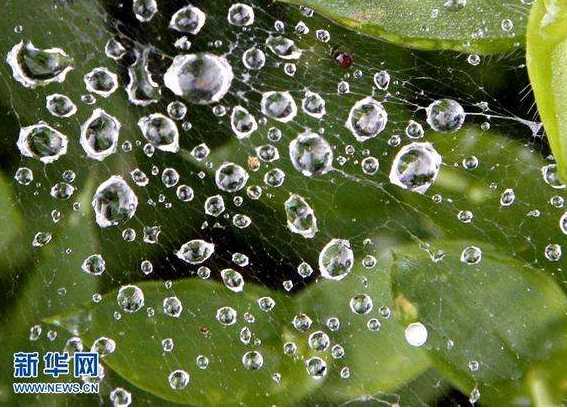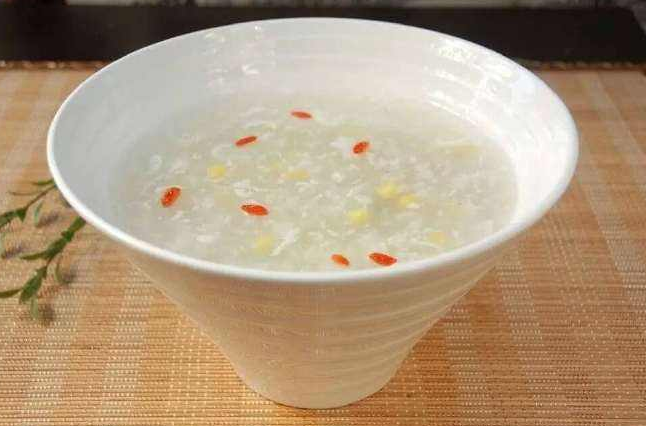
The traditional Chinese lunar calendar divides the year into 24 solar terms. White Dew, (Chinese: 白露), the 15th solar term of the year, begins this year on Sept 8 and ends on Sept 22. White Dew indicates the real beginning of cool autumn. The temperature declines gradually and vapors in the air often condense into white dew on the grass and trees at night.
Varying by geographical location, autumn comes earlier in the west and northeast of China. Right now Kanas in Xinjiang, Jiuzhaigou in Sichuan and the Greater Khingan Mountains in Northeastern China are entering the most beautiful season of the year.
From the first day of White Dew and as the season progresses, there is more and more dew. Although sunshine during the day makes it still hot, after sunset, temperatures decrease rapidly. At night, water vapor in the air turns into small drops of water when it encounters cold temperatures. These white water-drops adhere to flowers, grass and trees. When the morning comes, sunshine makes them look crystal clear, spotless white and adorable.
Here are 8 things you should know about White Dew.
Eating grapes
White Dew season comes right when grapes become widely available for sale. Eating grapes in autumn can help dispel one's internal heat and expel toxins.
Eating Longan
Longan fruit around White Dew is big, sweet and tastes great. There is a tradition in Fuzhou, East China's Fujian province, that eating longan on the first day of White Dew can help nourish the human body. It is said that one longan is as nutritious as an egg. Although this sounds exaggerated, longan does reinforce the spleen, nourish the blood, calm the nerves and improve one's looks.
White Dew Tea
Many regular tea drinkers in Nanjing favor White Dew Tea. Tea during White Dew has gone through the hot summer and is in its best state of growth. White Dew Tea is different from spring tea, which is usually too tender and doesn't last long. It is also different from summer tea, which is dry and has a bitter flavor. White Dew Tea instead tastes sweet with a sweet fragrance.

White Dew Wine
For some people in Nanjing, East China's Jiangsu province, whose hometowns are in Zhejiang province or the southern part of Jiangsu province, it is traditional to make White Dew Wine during this season. The wine is made of cereals, such as polished glutinous rice and kaoliang (a specific type of sorghum) and tastes a little sweet. In the past, country people in those regions all made the wine and served it to guests when entertaining.
Eating sweet potatoes
Many Chinese believe that the best food during White Dew is sweet potatoes. In the old days, peasants had the custom of eating sweet potato on the first day of White Dew. Besides being the No 1 vegetable against cancer, according to Chinese medicine, sweet potato can nourish the spleen. It can prolong life and reduce the risks of disease.
Ten "white" herbal medicines
People in Wenzhou, East China's Zhejiang province, have a tradition of gathering 10 herbal medicines on the first day of White Dew. The names of these herbal medicines all contain the Chinese word "bai" which means white, such as baimujin (white hibiscus). People believe that stewing these herbal medicines with black-bone chicken or duck can nourish the human body and cure arthritis.
Playing with swallow carts
In Tancheng county, East China's Shandong province, children play with swallow handcarts, a sharpened wooden cart in the shape of a swallow, on the first day of White Dew. People of every household there can make this kind of wooden toy, which can even make pleasing sounds. Pushing the swallow carts while running can help the children resist the cold and improve their bodily constitutions.
Offer sacrifices to Da Yu
White Dew is a time for people in the Taihu Lake area of East China to offer sacrifices to Da Yu, a hero who tamed floods by regulating rivers and watercourses. On the first day of White Dew, people also hold sacrificial rites for Da Yu on the eighth day of the first lunar month, on Tomb-sweeping Day, and on the seventh day of the seventh lunar month.

